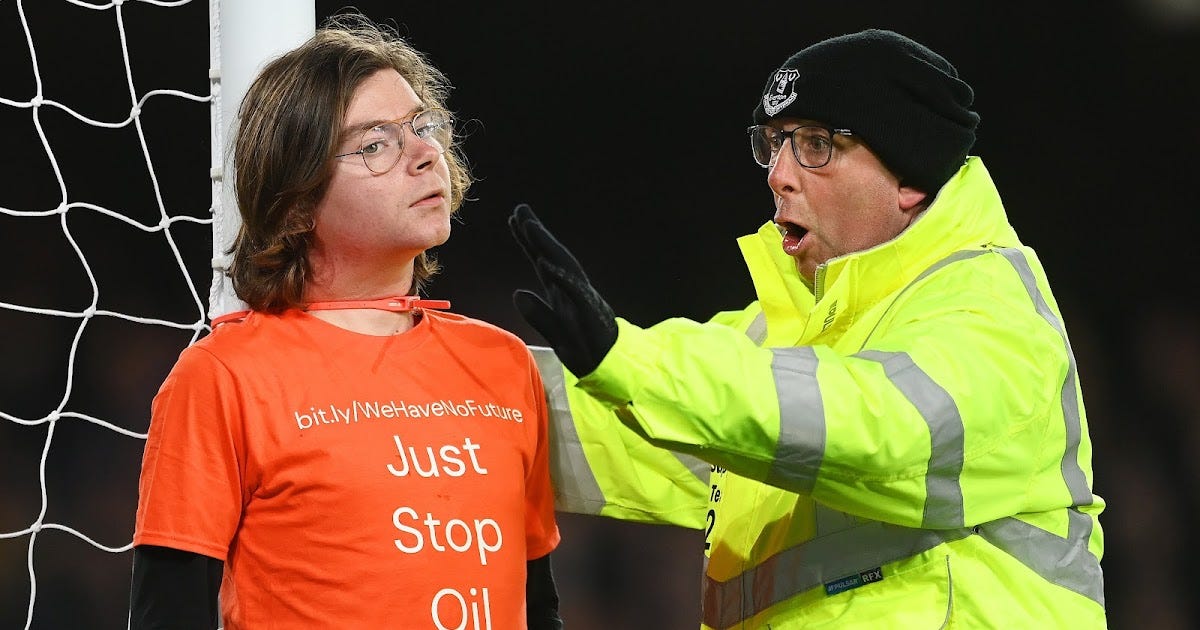I was totally wrong about Environmental Activism
Environmental Activism, calling the world's attention, to save the world.
Surely you have seen images or videos of people of different ages protesting peacefully (and sometimes) not so peacefully. These people, primarily young people, have been seen protesting in football fields, museums, public roads, and banks, all in the most peaceful way possible, except for the victimized art (although it ends up undamaged, contrary to the morals of art lovers).

If, when you see these images, you feel indignant or even angry, it means that the activism is fulfilling its main purpose: to attract attention.
Attracting the attention of the general public will be divided into two parts: one part will be interested in knowing the reason behind these protests and the other part will ask for the punishment of these actions that they consider illegal (in this case).
After getting the attention, the next thing is to establish a dialogue between the activists and the people with the necessary influence and power to achieve the changes in favor of what the activists are looking for: environmental justice.
You could say it's some kind of marketing.
Climate change and its effects are not a novelty, it is a phenomenon that is a consequence of actions that began with previous generations. Generations were born, grew up, lived, and saw climate change as something distant.
However, its consequences are more of the present than of the future.
Unfortunately, it doesn't seem to be getting any better.
Even though measures have been implemented, agreements and pacts have been reached between nations for decades, we are still plummeting toward the destruction of the fruitful and green planet as we know it. Actions are needed that represent an immediate solution.
Climate change must be faced as the problem it is. Current and future generations, young people, and children are the ones who will face the real effects of climate change.
What we know today as the effects of climate change is only the tip of the iceberg.
Its effects can be seen even with myopia or any other eyesight problem. A few weeks ago in Santo Domingo, we received torrential rains that in a matter of hours flooded the capital, representing losses of millions of Dominican pesos and even loss of life.
Now imagine this atmospheric anomaly becoming the new normal. If we continue with the same steps and at the same speed, this is likely to be the case.
That is exactly what Climate and Environmental Activism seek to avoid.
It is a weapon, although sometimes is not my favorite, it is functional and necessary to confront these problems with the rawness and seriousness that is necessary.
Environmental activism seeks to attract the attention of the political parties that influence us to make the change we need as quickly as possible.
Does the end justify the means?
The cases that have drawn the most attention have been those of Just Stop Oil. This organization of activists has carried out a series of "attacks" on the art in museums, as a call for their cause to be heard.
But... what is their cause?
Just Stop Oil is an environmental activist group based in the United Kingdom that seeks a commitment from its government to stop new licenses for the exploration, development, and production of fossil fuels.
Be it gas, coal, or any other non-renewable sources that are damaging the planet.
The UK government plans to license more than 100 oil and gas projects by 2025. Something contradictory when the goal of all countries is the reduction of greenhouse gas emissions, of which only 6% belongs to leaks and spills from the fossil fuel industry.
6% of greenhouse gas emissions are caused by leaks and spills from the fossil fuel industry.
In conjunction with the end of fossil fuels, Just Stop Oil seeks investment in renewable energies and the implementation of better insulation to prevent energy waste in homes, converting homes into more efficient buildings such as Passivhaus, or Passive Homes.
Just Stop Oil was born at the beginning of this year, and its first protests were in English soccer matches in the Premier League, where activists tied themselves to the goalposts.
Other types of protests were held at oil terminals and by blocking some of the UK's busiest roads.
However, the form of protest that has attracted the most attention has been at museums.
Their modus operandi has been to throw food sauce on the paintings and then attach a part of their body to the piece of art. It is important to point out that the paintings are unharmed because they have a protective frame.



Just Stop Oil is just one example among many. It is what the new generations have come up with to get the attention of those in power and make them understand that we must start changing for the better now.
Before it is too late if it is not already.
Sometimes it may seem that their actions are drastic, but "serious situations require drastic decisions".
If floods, increased droughts, temperatures, and loss of species and food do not highlight the seriousness in which we find ourselves, only the end of the world will.
The most serious consequence of these actions or "crimes", if it is correct to call them that, is the disturbance of the public peace in museums and public roads and the delay of football matches (by minutes because the lost minutes are later added). However, the one that is considered the most serious is the closure of important streets in the UK, which carries a penalty of up to 51 weeks of imprisonment.
Another example of environmental activism is Zero Hour, a group that has carried out a series of protests related to climate change, which has even led them to have direct talks with legislators.
Zero Hour is a U.S. environmental movement led by youth and young adults who seek to be an active part of the climate change and environmental justice conversation, seeking direct and effective action on climate change.
“Together, we are a movement of unstoppable youth organizing to protect our rights and access to the natural resources and a clean, safe, and healthy environment that will ensure a livable future where we not just survive, but flourish.”
Key activists and their achievements
Among other young activists you may (or may not) have heard of, who are quite promising are:
Francisco Vera
One that I met during COP27 and caught my attention for his young age but for his direct and plain words is Francisco Vera. Francisco is a Colombian environmentalist of only 12 years old, nationally and internationally recognized for his social and environmental campaigns.
He even says that he has received death threats for his actions.
Something regrettable but common in environmental activism.
"We are not just the future. We are already affected by the decisions adults make."
Francisco Vera
Greta Thunberg
Another young woman you may have already heard of, from the other side of the pond, is Greta Thunberg, a little older than Francisco, about 19 years old. Greta is a Swedish activist who has been an inspiration to thousands of adults and young people despite her young age on the issue of environmental justice.
These are two representatives of a generation that cares about the world we all inhabit, and about the consequences that will follow if we do not change course with the speed and impetus needed to counteract climate change.
My conclusion to all this is...
There are many means, ways, and routes to reach the same goal.
However, to change the path of no return to which we are heading, we must not only change the mentality of the people and citizens around us. In addition to this, we must make the people who have the power of change in their hands understand that money must be invested to heal the planet and make them understand that there is the possibility of MAKING MONEY without HARMING the environment.
Activism may seem annoying but it is necessary to communicate the seriousness of the problem we are involved in and that concerns us ALL.
Jr Nicolas of Reduce Entropy🌍






